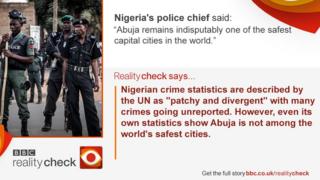- UID
- 20
- Online time
- Hours
- Posts
- Reg time
- 24-8-2017
- Last login
- 1-1-1970
|
|
━━━━━━━━━━━━━━━━━

▼ A recent spate of kidnappings and violent crimes has shaken Nigeria's capital Abuja, regarded as a relatively safe haven in a country facing major security challenges.
The national police chief, Mohammed Adamu, has sought to allay concerns by saying that Abuja actually has one of the lowest crime rates in the world.
Is he right?
Before we start looking at the numbers, it's important to consider the reliability of Nigeria's crime statistics.
Experts don't rate them highly - a recent United Nations report analysing homicide statistics describe existing Nigerian data as "patchy and divergent".
Security experts say many crimes go unreported in Nigeria because of distrust in the police, a lack of police presence on the ground, and a general feeling that reporting a crime will be unlikely to lead to redress.
The International Police Science Association, a group of security experts and researchers, ranks Nigeria bottom in a global index that measures factors including confidence in the police, corruption and security outcomes.
So the likelihood is that official statistics would significantly under-report crime rates in Abuja and across Nigeria.
Now, let's look at the available data, starting with the recorded murder rate in Abuja compared with other major cities around the world.
Global city homicide rates
Deaths per 100,000
*Abuja and Lagos figures are murder rates, which don't include non-intentional killing.
Source: UNODC, Nigeria's National Bureau of Statistics
On this measure, Abuja does not rate among the safest cities, as the Nigerian police chief has claimed - and there are plenty of other cities we could have chosen as comparisons to make the point.
The government's own data suggests that the murder rate in Nigeria's largest city, Lagos, is lower per capita than it is in the capital, Abuja.
How about other measures of safety? (▪ ▪ ▪)
► Please, continue reading this article here: Source |
|